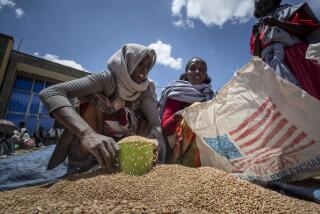U.S. to resume aid to Kopassus, Indonesia’s controversial military forces
- Share via
Reporting from Jakarta, Indonesia — The Obama administration said Thursday it would resume assistance to Indonesia’s special forces, which had been barred from receiving U.S. military aid for more than a decade because of human-rights abuses.
The decision was criticized by a human-rights group that contends rights violations by the special forces, including their role in a campaign of violence against separatists in East Timor during the late 1990s, have never been thoroughly investigated.
The announcement came after months of negotiations with the Indonesian government, which agreed to remove several special-forces soldiers convicted of human-rights violations and committed to suspend members of the unit who were accused of abuses in the future, according to senior U.S. Defense officials.
Defense Secretary Robert M. Gates informed Indonesian President Susilo Bambang Yudhoyono of the move after arriving in Jakarta on Thursday on the fourth day of a trip to Asia.
In a statement to reporters at the presidential palace, Gates emphasized that the U.S. assistance to the unit would be limited initially and would not involve combat training or other forms of lethal assistance. He added that resumption of assistance did not “signal any lessening of the importance we place on human rights and accountability.”
But critics questioned Thursday whether the Indonesian government’s commitments went far enough in addressing past abuses by the 5,000-member special forces, known as Kopassus.
Human Rights Watch had urged the Obama administration to require the Indonesian government to take several steps, including establishment of an ad hoc tribunal to investigate the disappearance of Indonesian student activists in the late 1990s and the permanent discharge of all military personnel convicted of human-rights violations.
“The Obama administration has just failed a key test. This is not the way to encourage reform with a military that has yet to demonstrate a genuine commitment to accountability for serious human rights abuses,” said Sophie Richardson, Asia advocacy director at Human Rights Watch. “This decision rewards Kopassus for its intransigence over abuses and effectively betrays those in Indonesia who have fought for decades for accountability and justice.”
The U.S. broke off contact with Kopassus in 1999, following allegations that it aided militias in East Timor that carried out massacres of roughly 1,400 Timorese. In response, Congress passed a law prohibiting assistance unless the recipients had been vetted to ensure they had not committed human-rights abuses.
Some soldiers who were convicted or had serious allegations against them have left Kopassus but remained in the armed services, according to Human Rights Watch. Lt. Gen. Sjafrie Sjamsoeddin, the organization noted in a February letter to Gates, was implicated in a massacre in East Timor while serving in Kopassus and had “never been subjected to a credible investigation.” He was appointed deputy defense minister in January.
Pentagon officials argued that the Indonesian government had made strides in cleaning up the special forces and that resuming ties was important because of the central role the forces played in Indonesia, the world’s largest Muslim country.
Many top generals in the Indonesian armed forces are drawn from Kopassus, and the unit deploys overseas as part of Indonesia’s contribution to international peacekeeping forces. It also can be called to assist the police with counter-terrorism missions inside Indonesia, where militant groups in recent years have periodically targeted hotels and other targets in bomb attacks.
Gates said that the U.S. had laid out a path for resuming ties during discussions with Indonesian officials earlier this year and that all of the U.S. conditions had been met.
One condition was that members of the unit who had been convicted of human-rights abuses be removed from the unit. The U.S. was aware of “fewer than a dozen” such individuals, according to a senior Defense official who briefed reporters, speaking on condition of anonymity. All of them have now been removed from Kopassus, the U.S. official said, though some may still be in the armed forces.
In its letter to Gates earlier this year, Human Rights Watch cited the case of Lt. Col. Tri Hartomo, who it said was convicted of abuse leading to the 2001 death of an activist from Papua, Indonesia’s largest province. After his conviction, Hartomo continued to serve in a senior position in Kopassus, but he was removed earlier this year, according to the U.S. official.
“Our ability to expand on these initial steps will depend on continued implementation of reforms within Kopassus and TNI as a whole,” Gates said. TNI is the acronym for the Indonesian armed forces.
Gates said members of Congress had been briefed in recent days on the decision and that “by and large, the feedback I’ve gathered is that they thought these limited steps were OK.” He added that the State Department, which was responsible for vetting Indonesian soldiers and had long been seen as more skeptical of the human rights reforms in Indonesia than the Pentagon, backed a limited resumption of aid.
More to Read
Sign up for Essential California
The most important California stories and recommendations in your inbox every morning.
You may occasionally receive promotional content from the Los Angeles Times.














